人教版八年级上册时态一般将来时
人教版八年级英语上册Unit6知识归纳

一.单元语法聚焦:一般将来时:表示将要发生的动作或状态及打算、计划准备要做饿事情,常与表示将来的时间状语连用。
㈠肯定结构:1.主语+be动词+going to+do动词原形(be动词要与主语人称保持一致)I (am) ,you/ we/ they (are), she/ he / it (is)2.主语+will + do动词原形Jim is going to play football.Jim will play football.㈡否定结构:be not going to do / will not (won’t) do㈢标志词:1.this+时间(this morning, this afternoon, this evening, this weekend…)2.next +时间(next weekend, next week, next year…) 3.Tomorrow, tonight, the day after tomorrow..㈣be going to 的用法:⑴be going to do sth 表示将来的打算、计划或安排。
⑵常与表示将来的tomorrow, next year等时间状语或when 引导的时间状语从句连用。
when引导的从句用一般现在时态。
⑶各种句式变换,句式变换借助be 动词完成,be随主语有am, is, are 的变换。
①肯定句:主语+ be going to + 动词原形+ 其他He is going to take the bus there when he is free.②否定句:主语+ be not going to + 动词原形+ 其他I’m not going to see my friends this weekend.③一般疑问句:Be +主语+ going to +动词原形+其他肯定回答:Yes, 主语+ be.否定回答:No, 主语+ be not.—Are you going to see your friends this weekend? —Yes ,I am. / No, I’m not.④特殊疑问句:疑问词+ be +主语+ going to +动词原形+其他?What is he going to do this weekend?When are you going to see your friends?⑷如果表示计划去某地,可直接用be going to+地点We are going to Beijing for a holiday..⑸表示位置移动的动词,如go , come, leave ,move等常用进行时表示将来时态表示近期打算做某事。
人教版八年级英语上册知识点总结

人教版八年级英语上册知识点总结一、基本语法1.时态:英语时态分为以下几种:现在时、过去时、将来时。
每种时态又分为简单时态、进行时态、完成时态和完成进行时态等。
例如:–现在时:简单现在时: 主语 + 动词原形;进行现在时:主语 + be(am/is/are) + v-ing;完成现在时:主语 + have / has + 过去分词;完成进行现在时:主语 + have / has + been + v-ing。
–过去时:简单过去时:主语 + 动词过去式;进行过去时:主语 + was / were + v-ing;完成过去时:主语 + had + 过去分词;完成进行过去时:主语 + had + been + v-ing。
–将来时:简单将来时:主语 + will / shall + 动词原形;进行将来时:主语 + will / shall + be + v-ing;完成将来时:主语 + will / shall + have + 过去分词;完成进行将来时:主语 + will / shall + have + been + v-ing。
2.倒装句:倒装是指把谓语动词放在主语前面形成的一种语法现象。
如:Only in this way can we solve the problem. (只有这样才能解决问题。
) 倒装句句型格式为:_____+主语(名词或代词)+_____。
在不同的情况下需要用到不同的“辅助动词/助动词”来进行倒装。
3.被动语态:被动语态就是在句子中表达动作的承受者(即主语)的语态。
结构为:被(或受)动责任的动词(to be) + 过去分词。
如:The book was written by him.(这本书是由他写的。
)4.虚拟语气:虚拟语气是指在表示假设,愿望,建议等语气时所使用的一种语态形式。
其结构为:主语+should/could/might/would+(have)+动词原形。
如: If I were you, I would buy this dress(如果我是你,我会买这件衣服。
人教版八年级英语知识点总结
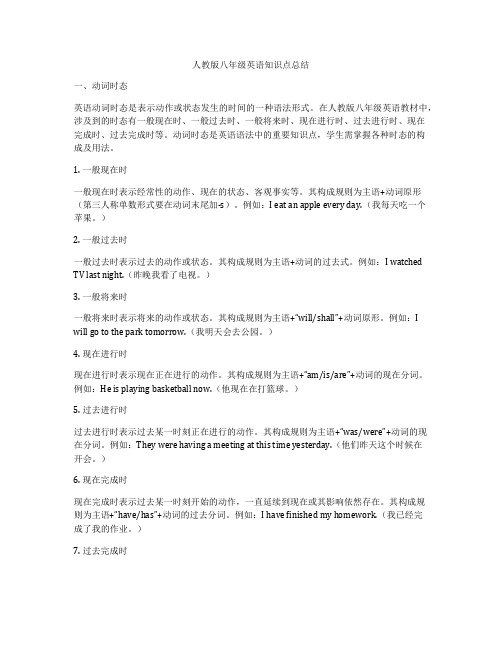
人教版八年级英语知识点总结一、动词时态英语动词时态是表示动作或状态发生的时间的一种语法形式。
在人教版八年级英语教材中,涉及到的时态有一般现在时、一般过去时、一般将来时、现在进行时、过去进行时、现在完成时、过去完成时等。
动词时态是英语语法中的重要知识点,学生需掌握各种时态的构成及用法。
1. 一般现在时一般现在时表示经常性的动作、现在的状态、客观事实等。
其构成规则为主语+动词原形(第三人称单数形式要在动词末尾加-s)。
例如:I eat an apple every day.(我每天吃一个苹果。
)2. 一般过去时一般过去时表示过去的动作或状态。
其构成规则为主语+动词的过去式。
例如:I watched TV last night.(昨晚我看了电视。
)3. 一般将来时一般将来时表示将来的动作或状态。
其构成规则为主语+“will/shall”+动词原形。
例如:I will go to the park tomorrow.(我明天会去公园。
)4. 现在进行时现在进行时表示现在正在进行的动作。
其构成规则为主语+“am/is/are”+动词的现在分词。
例如:He is playing basketball now.(他现在在打篮球。
)5. 过去进行时过去进行时表示过去某一时刻正在进行的动作。
其构成规则为主语+“was/were”+动词的现在分词。
例如:They were having a meeting at this time yesterday.(他们昨天这个时候在开会。
)6. 现在完成时现在完成时表示过去某一时刻开始的动作,一直延续到现在或其影响依然存在。
其构成规则为主语+“have/has”+动词的过去分词。
例如:I have finished my homework.(我已经完成了我的作业。
)7. 过去完成时过去完成时表示过去某一时刻之前已经发生的动作。
其构成规则为主语+“had”+动词的过去分词。
例如:She had gone to the park before I arrived.(我到达之前她已经去公园了。
人教版八年级上册英语知识点总结
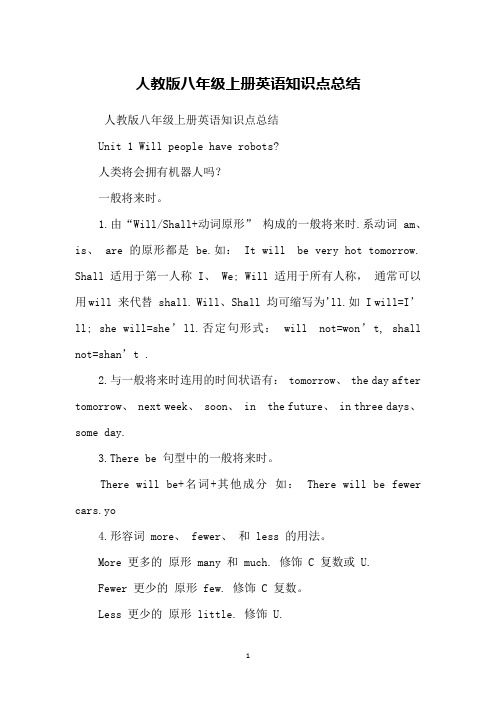
人教版八年级上册英语知识点总结人教版八年级上册英语知识点总结Unit 1 Will people have robots?人类将会拥有机器人吗?一般将来时。
1.由“Will/Shall+动词原形”构成的一般将来时.系动词 am、is、 are 的原形都是 be.如: It will be very hot tomorrow. Shall 适用于第一人称 I、 We; Will 适用于所有人称,通常可以用will 来代替 shall. Will、 Shall 均可缩写为’ll.如 I will=I’ll; she will=she’ll.否定句形式: will not=won’t, shall not=shan’t .2.与一般将来时连用的时间状语有: tomorrow、 the day after tomorrow、 next week、 soon、 in the future、 in three days、some day.3.There be 句型中的一般将来时。
There will be+名词+其他成分如: There will be fewer cars.yo4.形容词 more、 fewer、和 less 的用法。
More 更多的原形 many 和 much. 修饰 C 复数或 U.Fewer 更少的原形 few. 修饰 C 复数。
Less 更少的原形 little. 修饰 U.Unit2 What should I do?我应该做什么?1.情态动词 should.Should 和 can、 may、 must 等情态动词一样,无人称和数的变化,后接动词原形,能独立构成疑问句和否定句。
如: Who should pay the taxes? You shouldn’t play football in the street.2.情态动词 could.单独的情态动词,表“能,可以”。
用来提供建议,后跟动词原形.它和 should 都用来提供建议。
人教版新目标八年级上册-英语语法知识点
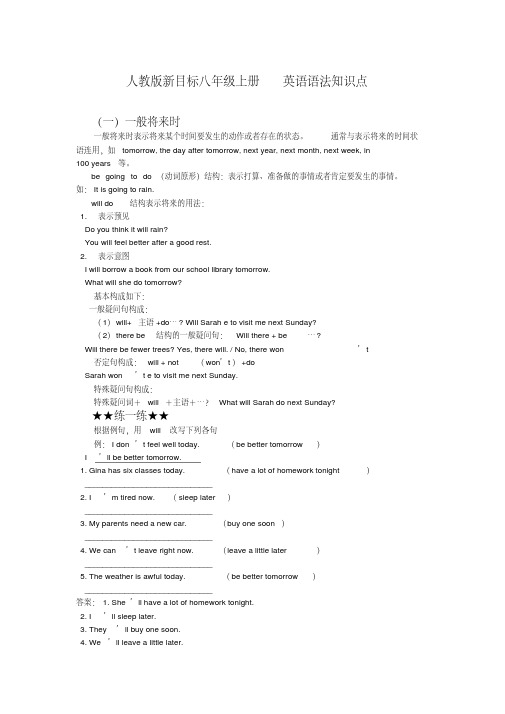
人教版新目标八年级上册英语语法知识点(一)一般将来时一般将来时表示将来某个时间要发生的动作或者存在的状态。
通常与表示将来的时间状语连用,如tomorrow, the day after tomorrow, next year, next month, next week, in100 years等。
be going to do(动词原形)结构:表示打算、准备做的事情或者肯定要发生的事情。
如:It is going to rain.will do结构表示将来的用法:1. 表示预见Do you think it will rain?You will feel better after a good rest.2. 表示意图I will borrow a book from our school library tomorrow.What will she do tomorrow?基本构成如下:一般疑问句构成:(1)will+主语+do…? Will Sarah e to visit me next Sunday?(2)there be 结构的一般疑问句:Will there + be …?Will there be fewer trees? Yes, there will. / No, there won’t 否定句构成:will + not (won’t)+doSarah won’t e to visit me next Sunday.特殊疑问句构成:特殊疑问词+will+主语+…?What will Sarah do next Sunday?★★练一练★★根据例句,用will改写下列各句例:I don’t feel well today. (be better tomorrow)I’ll be better tomorrow.1. Gina has six classes today. (have a lot of homework tonight)_____________________________2. I’m tired now. (sleep later)_____________________________3. My parents need a new car. (buy one soon)_____________________________4. We can’t leave right now. (leave a little later)_____________________________5. The weather is awful today. (be better tomorrow)_____________________________答案:1. She’ll have a lot of homework tonight.2. I’ll sleep later.3. They’ll buy one soon.4. We’ll leave a little later.5. Maybe it’ll be better tomorrow.(二)should的用法:should用来提出建议和忠告,后边加动词原形,否定句直接在should后边加not.例如:I think you should eat less junk food.我认为你应该少吃垃圾食品。
Unit 6一般将来时be going to(重点语法提升练) (人教版)

2022-2023学年八年级英语上册单元模块满分必刷题(人教版)Unit 6【刷语法】(重点语法提升练) 一般将来时be going to一般将来时一般将来时表示将来某一时刻的动作或状态,或将来某一段时间内经常的动作或状态。
常与一些表示将来的时间状语连用,如:tomorrow(明天),next week(下周),from now on(从现在开始);in the future(将来),in a few days等。
1、基本结构:be going to+动词原形一般将来时:be going to+动词原形意为自己打算做某事、计划做某事或者有意做某事,be 动词随主语不同可变为is,am,are.它的句式变化如下:一、单项选择1.(2021·河北·石家庄市第四十二中学八年级期中)— What is your plan for next weekend, Lingling?— I ________ volunteer(志愿者) work in the museum.A.is going to do B.did C.am going to do D.does2.(2022·江苏·八年级课时练习)Look! It is dark outside. I think it ________ soon.A.is going to rain B.rains C.is raining D.rained3.There ________ a basketball competition this weekend.A.will take place B.will hold C.is going to be D.will have4.(2021·重庆市璧山中学校八年级期中)—Look at the poster on the wall!—Wow! There _______ an art show next month in Bishan Middle School.A.is going to be B.is going to have C.are going to be D.are going to have 5.(2021·上海奉贤·八年级期中)There is going to ________ a football match this afternoon.A.have B.has C.is D.be6.(2021·山东济南·八年级期中)—What do you plan to do this weekend?—We ________ soccer. We play it once a week.A.play B.playedC.are going to play D.are playing7.(2021·广东·湛江一中培才学校八年级期中)There ________ a concert at 7:00 this evening.A.is going to have B.is going to be C.is having D.will have8.(2021·河北·石家庄市第二十八中学八年级期中)There ________ two new movies in Sunshine Movie Theater tonight.A.is going to have B.will have C.is going to be D.are going to be 9.(2021·河北·石家庄市第二十八中学八年级期中)—Shall we go to the museum tomorrow?—I’d love to, but I’m afraid I can’t. I ________ my grandparents.A.visit B.visited C.am going to visit D.is visiting 10.(2021·河北·石家庄市第二十五中学八年级期中)— Mom, I ________ my clothes when I come back home.— OK. You promise me.A.am washing B.am going to wash C.washed D.wash11.(2021·黑龙江·哈尔滨市第十七中学校八年级期中)—Are there any robots in your home now?—No, but there ________ a lot of robots in people’s homes ________.A.will be, 100 years ago B.are going to have, in 100 years C.are going to be, in 100 years 12.(2019·福建省福州第十九中学八年级期中)Look at those big black clouds. It ________ rain. Let’s hurry.A.must B.will C.would D.is going to 13.(2021·广东·东莞市新世纪英才学校八年级期中)________ your cousin ________ me next week? A.Is; going to visit B.Does; going to visit C.Is; goes to visit D.Does; goes to visit 14.(2018·广东·珠海市斗门区实验中学八年级期中)—My sister and I _________ the park this Sunday. Do you want to go with us?A.visit B.visits C.visited D.are going to visit 15.(2020·辽宁·灯塔市教师进修学校八年级期中)There is going to ________ a meeting the day aftertomorrow(后天).A.have B.be C.has D./二、完成句子16.——本周末打算去哪儿野餐,杰克?——玉湖公园。
人教版八年级上英语时态总结
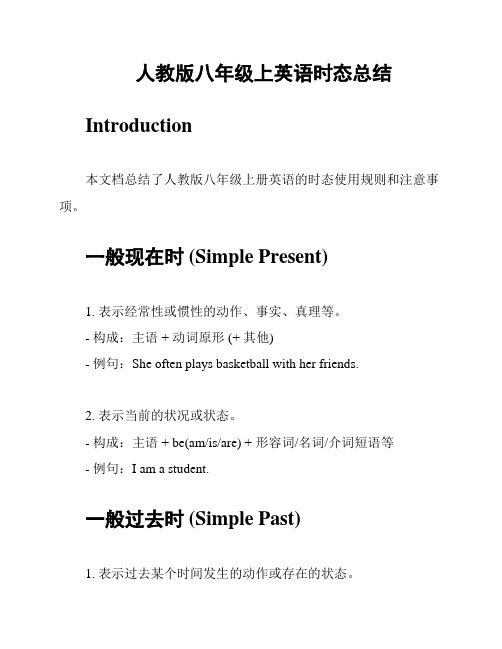
人教版八年级上英语时态总结Introduction本文档总结了人教版八年级上册英语的时态使用规则和注意事项。
一般现在时 (Simple Present)1. 表示经常性或惯性的动作、事实、真理等。
- 构成:主语 + 动词原形 (+ 其他)- 例句:She often plays basketball with her friends.2. 表示当前的状况或状态。
- 构成:主语 + be(am/is/are) + 形容词/名词/介词短语等- 例句:I am a student.一般过去时 (Simple Past)1. 表示过去某个时间发生的动作或存在的状态。
- 构成:主语 + 动词过去式 (+ 其他)- 例句:He studied English last night.一般将来时 (Simple Future)1. 表示将来某个时间或将来经常性发生的动作。
- 构成:主语 + will + 动词原形 (+ 其他)- 例句:They will visit their grandparents next week. 现在进行时 (Present Continuous)1. 表示当前正在进行的动作。
- 构成:主语 + be(am/is/are) + 现在分词(+ 其他) - 例句:She is watching TV right now.过去进行时 (Past Continuous)1. 表示过去某个时间正在进行的动作。
- 构成:主语 + was/were + 现在分词(+ 其他)- 例句:They were playing soccer at that time.高级时态1. 现在完成时 (Present Perfect)- 表示过去的某个时间到现在的动作或状态。
- 构成:主语 + have/has + 过去分词(+ 其他)- 例句:I have finished my homework.2. 过去完成时 (Past Perfect)- 表示过去的某个时间之前的动作或状态。
人教版八年级英语知识点

人教版八年级英语知识点人教版八年级英语知识点概述一、语法知识1. 时态- 一般现在时:用于描述经常发生的动作或状态。
- 一般过去时:用于描述过去发生的动作或状态。
- 现在进行时:表示正在进行的动作。
- 过去进行时:表示过去某个时间点正在进行的动作。
- 一般将来时:表示将来会发生的动作或状态。
2. 语态- 被动语态:表示动作的承受者,通常由“be + 过去分词”构成。
3. 非谓语动词- 动名词:作为名词使用,可以作主语、宾语等。
- 分词:现在分词和过去分词,用作形容词或副词。
- 不定式:to + 动词原形,可以用作名词、形容词、副词等。
4. 情态动词- can, could, may, might, must, should, ought to 等,表示可能性、许可、建议等。
5. 代词- 人称代词:主格和宾格。
- 物主代词:形容词性物主代词和名词性物主代词。
- 反身代词、指示代词、疑问代词等。
6. 句子结构- 简单句、并列句和复合句(包括定语从句、状语从句、宾语从句等)。
二、词汇与短语1. 基础词汇- 常见名词、动词、形容词、副词、介词等。
- 与日常生活、学习、工作等相关的词汇。
2. 短语动词- 例如:look after, take care of, turn off, give up 等。
3. 常见短语- 例如:make a decision, pay attention to, be interested in, be good at 等。
三、阅读理解1. 快速阅读- 通过扫读(skimming)和查读(scanning)技巧,快速获取文章大意。
2. 细读理解- 深入理解文章细节,把握作者意图和文章结构。
3. 推理判断- 根据上下文推断生词含义,理解隐含信息。
四、写作技巧1. 句式多样性- 使用不同类型的句子结构,增加文章的丰富性。
2. 段落结构- 每个段落应有中心句,后跟支持细节。
3. 写作类型- 掌握不同类型的写作,如记叙文、说明文、议论文等。
人教版八年级上册一般将来时课件

补充说明:
There be 表“将来有…”时 用There will be 表示某地将存在某物,有时可与there is/are going to be 相互换。 There be 句型只表示存在关系,人或物并不属于某个地方,所以 句中不能出现表示所由关系的have/has There will be a football match on TV this afternoon. There will be word peace.
Look at thouse black clouds! It’s going to rain. (表推测) 在表示预测时,是说话人做出的预测,而不是天气it在做预测。
will do的常用标志词:
in the future 将来, tomorrow 明天, this evening 今晚上, next week /month/year下周/月/年,in + 时间段。也可在when, before , after, until等引导的时间状语从句中使用。
—Father’s Day is around the corner. I __A__ a gift for my father.
A. am going to buy
B. have bought
C. bought
D. was buying
(2022 安徽)
Exercise:
3. —There __B__ a basketball game against Class Two this Sunday.
初中英语 人教版八年级上册语法专项-一般将来时讲解+时态混合练习题(含答案)

一般将来时讲解与时态混合练习题“be going to+动词原形”是一般将来时的一种表达形式,表示将要发生的动作或情况,be动词随主语的人称和数的变化而变化。
1.肯定句:主语+be going to+动词原形+其他2.否定句:主语+be not going to+动词原形+其他.3.一般疑问句:Be+主语+going to+动词原形+其他?肯定回答:Yes,主+be.否定回答:No,主语+be not.4.特殊疑问句:疑问词+be+主语+going to+动词原形+其他?用法:(1)表示将要发生的动作或安排,或打算、计划、决定要做的事。
(2)表示主语根据当前的情况做出的预测。
通常是有迹象表明某事即将发生,表达说话人较肯定的判断,指即将发生或肯定要发生的事,常用于I'm sure,I'm afraid或I think等后面。
(3)常与be going to连用的时间状语be going to 表达的是未发生的动作,因此常与一些表示将来的时间状语连用。
例如:tomorrow,this evening,next month,in three weeks等。
有时也可与before, after等引导的时间状语从句连用。
一般将来时1)一般将来时的构成:1. 助动词will(shall)+动词原形2. am / is / are+going to +动词原形2)一般将来时的用法:1.将要发生的动作。
例如:I will leave for Beijing tomorrow.2.将要存在的状态。
例如:This time next year I will be in Japan. Where will you be?3.打算要做的事。
例如:Are you going to watch the film on television tonight?3)常用于一般将来时的时间状语:tomorrow、next week、in 2008等。
英语人教版八年级上册一般将来时态课件

ExⅡ.用所给词的适当形式填空。 will be 1.There ___________ (be)an American film next week. will finish 2.They ____________(finish) the work this
4.Robots___________(do) lots of work in our will do homes in the future. will be 5.There ___________(be) strong winds tonight. will forget 6.Before long,he__________(forget) all abou the matter.
※3祈使句+and /or +将来时(will) 努力工作,否则你就会失败 。
Work hard,or you will fail.
努力工作,你就会成功。
Work hard ,and you will succeed.
一般将来时态的四种情况: 1.be +going to +动词原形 2.will+动词原形(I / We +shall) 3.be+V-ing(现在进行时表将来) 4.一般现在时表将来 1. be +going to +动词原形的用法: ●表示计划、安排要做的事情。 What are you going to do this evening? I am going to watch talent shows. ●表示根据现在的迹象推断未来可能发生的事 情。 Look at the dark clouds.It is going to rain.
• come, go,leave,start,arrive,stay,fly,take off等动
初二英语上四种时态总结(一般过去时,一般现在时,现在进行时,一般将来时)
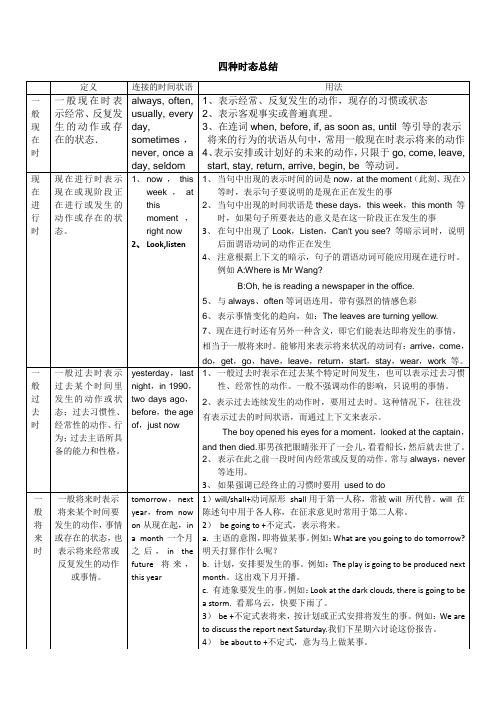
四种时态总结注意事项【注意】不宜用进行时态的动词:表示心理状态、情感的动词,如:love, like, hate, care, know, understand, forget, remember, believe, want, agree, wish, mean 等;表示存在的动词,如:be, lie(位于) 等;表示一瞬间发生的动作,如:get, buy, end, receive 等。
例:I like English very much. 和Guizhou lies in the south of China.一般将来时与一般现在时区别(一)现在进行时表示动作的暂时性,而一般现在时表示动作的习惯性和经常性I am watching TV now. (暂时性)I watch TV every day. (经常性)(二)现在进行时可表示短暂性动作,而一般现在时表示长久性动作。
Lucy is living in Beijing.(短时间居住)Lucy lives in Beijing. (长久性居住)(三)现在进行时表示的动作可带有感情色彩,而一般现在时所表述的动作通常是事实。
You’re always forgetting the most important t hings. (责备)He is always helping others. (赞扬)He often helps others. (事实)(四)有些动词不能用进行时,know,understand,love,like,hate,wish,want,think,hope,have,believe,agree,hear,see,notice,等等。
这些动词通常用一般现在时表示说话时发生的动作。
I have a lot of friends here.注意:He is falling and downstairs。
(他正在从楼上摔下来)如果有人说摔下来是一瞬间的事不能用现在进行时是不对的,因为我们描述的是他正在摔下来,而不是要已经摔下来了。
人教八年级英语必考八大时态结构及用法详解
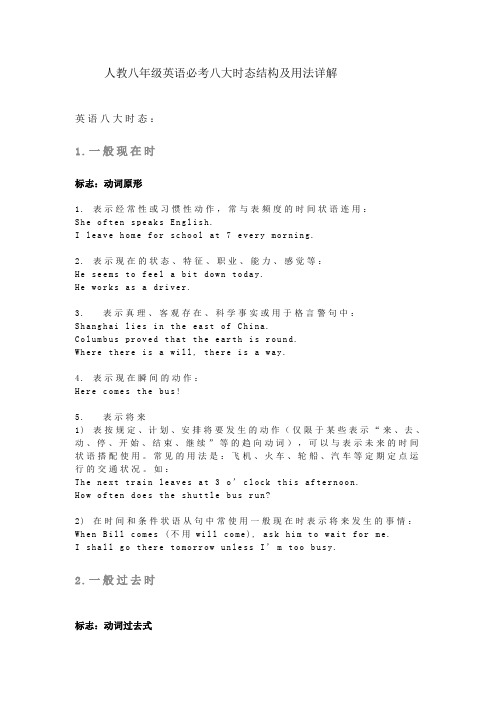
人教八年级英语必考八大时态结构及用法详解英语八大时态:1.一般现在时标志:动词原形1.表示经常性或习惯性动作,常与表频度的时间状语连用:S h e o f t e n s p e a k s E n g l i s h.I l e a v e h o m e f o r s c h o o l a t7e v e r y m o r n i n g.2.表示现在的状态、特征、职业、能力、感觉等:H e s e e m s t o f e e l a b i t d o w n t o d a y.H e w o r k s a s a d r i v e r.3.表示真理、客观存在、科学事实或用于格言警句中:S h a n g h a i l i e s i n t h e e a s t o f C h i n a.C o l u m b u s p r o v e d t h a t t h e e a r t h i s r o u n d.W h e r e t h e r e i s a w i l l,t h e r e i s a w a y.4.表示现在瞬间的动作:H e r e c o m e s t h e b u s!5.表示将来1)表按规定、计划、安排将要发生的动作(仅限于某些表示“来、去、动、停、开始、结束、继续”等的趋向动词),可以与表示未来的时间状语搭配使用。
常见的用法是:飞机、火车、轮船、汽车等定期定点运行的交通状况。
如:T h e n e x t t r a i n l e a v e s a t3o’c l o c k t h i s a f t e r n o o n.H o w o f t e n d o e s t h e s h u t t l e b u s r u n?2)在时间和条件状语从句中常使用一般现在时表示将来发生的事情:W h e n B i l l c o m e s(不用w i l l c o m e),a s k h i m t o w a i t f o r m e.I s h a l l g o t h e r e t o m o r r o w u n l e s s I’m t o o b u s y.2.一般过去时标志:动词过去式*闭音节:元音字母a, e, i, o, u如果发字母本来的音则称为开音节,否则称为闭音节。
人教版初中英语八年级上册时态归纳和作文
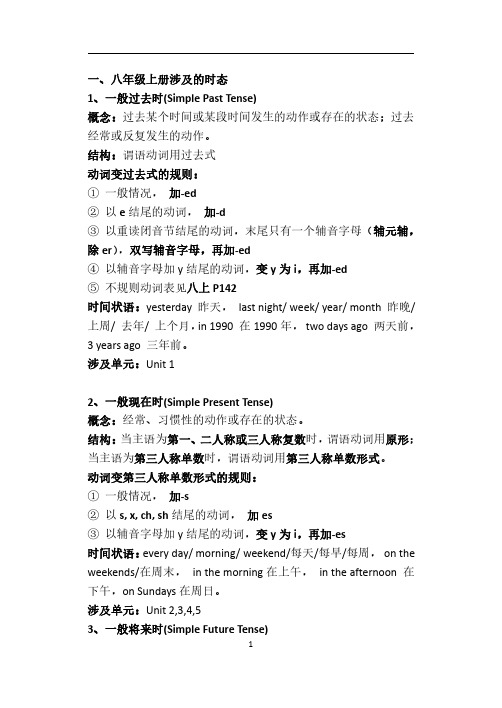
一、八年级上册涉及的时态1、一般过去时(Simple Past Tense)概念:过去某个时间或某段时间发生的动作或存在的状态;过去经常或反复发生的动作。
结构:谓语动词用过去式动词变过去式的规则:①一般情况,加-ed②以e结尾的动词,加-d③以重读闭音节结尾的动词,末尾只有一个辅音字母(辅元辅,除er),双写辅音字母,再加-ed④以辅音字母加y结尾的动词,变y为i,再加-ed⑤不规则动词表见八上P142时间状语:yesterday昨天,last night/week/year/month昨晚/上周/去年/上个月,in1990在1990年,two days ago两天前,3years ago三年前。
涉及单元:Unit12、一般现在时(Simple Present Tense)概念:经常、习惯性的动作或存在的状态。
结构:当主语为第一、二人称或三人称复数时,谓语动词用原形;当主语为第三人称单数时,谓语动词用第三人称单数形式。
动词变第三人称单数形式的规则:①一般情况,加-s②以s,x,ch,sh结尾的动词,加es③以辅音字母加y结尾的动词,变y为i,再加-es时间状语:every day/morning/weekend/每天/每早/每周,on the weekends/在周末,in the morning在上午,in the afternoon在下午,on Sundays在周日。
涉及单元:Unit2,3,4,53、一般将来时(Simple Future Tense)概念:将来某个时间要发生的动作或存在的状态;将来经常或反复发生的动作。
结构:be going to+v.原;will/shall+v.原There will be;there is/are going to be时间状语:tomorrow明天,next week/month/year下周/下个月/明年,in+一段时间in100years100年后,in25years25年后。
人教版英语八年级上册 Unit6-7语法重点:一般将来时_专项讲解与练习 (有答案)
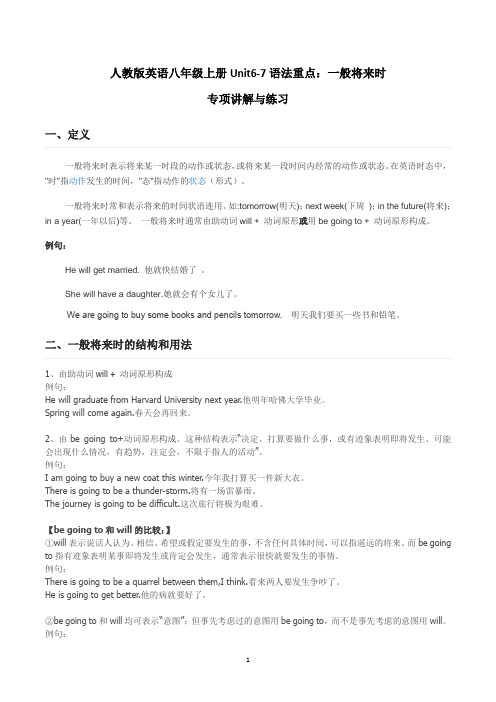
人教版英语八年级上册Unit6-7语法重点:一般将来时专项讲解与练习一般将来时表示将来某一时段的动作或状态,或将来某一段时间内经常的动作或状态。
在英语时态中,"时"指动作发生的时间,"态"指动作的状态(形式)。
一般将来时常和表示将来的时间状语连用。
如:tomorrow(明天);next week(下周);in the future(将来);in a year(一年以后)等。
一般将来时通常由助动词will + 动词原形或用be going to + 动词原形构成。
例句:He will get married. 他就快结婚了。
She will have a daughter.她就会有个女儿了。
We are going to buy some books and pencils tomorrow. 明天我们要买一些书和铅笔。
1、由助动词will + 动词原形构成例句:He will graduate from Harvard University next year.他明年哈佛大学毕业。
Spring will come again.春天会再回来。
2、由be going to+动词原形构成。
这种结构表示“决定、打算要做什么事,或有迹象表明即将发生、可能会出现什么情况,有趋势,注定会,不限于指人的活动”。
例句:I am going to buy a new coat this winter.今年我打算买一件新大衣。
There is going to be a thunder-storm.将有一场雷暴雨。
The journey is going to be difficult.这次旅行将极为艰难。
【be going to和will的比较:】①will表示说话人认为、相信、希望或假定要发生的事,不含任何具体时间,可以指遥远的将来。
而be going to指有迹象表明某事即将发生或肯定会发生,通常表示很快就要发生的事情。
初中英语人教版八年级上册一般将来时

be going to与will的区别
will
未经事先考虑的意图,临时决定的。 事先考虑好的意图,或做好安排.
be going to
If you want to go, I’ll meet you at 5 o’clock. (临时的决 定) I feel terrible, I think I’m going to be sick. I’m going to be 16 years old next year. Look at the clouds! It’ s going to rain! (表示有迹象要发生某一动作时,要用be going to)
当它们用于一般将来时态时, in后接“时间段”,
after后接“时间点”。
1. He’ll come back in three years. 他三年以后回来。
2. He’ll come back after three o’clock. 他三点钟以后回来。
例句:
1.I will call you this evening. 2.Students will use computers to learn in the future. 3.He will help his sister with her lessons. 4.We won`t be free(空闲的) this afternoon. 5.She will not listen to me. 6.The birds won`t fly away to the south when the weather turns cold. 7.There will be a strong wind soon. 8.I will not tell it to him. 9.I think it will be very hot in Beijing next summer. 10.He will use his pen and his calculator. 11.Will there be heavy rain and strong winds?
英语人教版八年级上册时态

1一般现在时态:表示经常或者反复发生的动作。 every day .often, usually, always, on Sundays 肯定句:非三单 +动词原形 三单+ 动词s/es 否定句: 非三单+ don’t 动词原形 三单+ doesn’t 动词原形 问句: Do +非三单 + 动词原形? Does +三单+ 动词原形? 2、一般过去时态: 表示过去发生的动作。 Yesterday, last week, two days ago 肯定句: 主语 + 动词过去式 否定句: 主语+ didn’t 动词原形
ห้องสมุดไป่ตู้
plays • 1.Tom _____(play) basketball every day. cleaned • 2. They ________(clean) the classroom yesterday. Will see • 3. ______ you ______(see) the film next week? have seen • 4.I ___________( see) the film already. did see • What _______you ______it ? doesn't read 5. She _________(not read) English every morning. Has he _______(read) read • 6. _____ the book yet? haven't finished (not finish) homework yet. 7.We __________ won't ride • 8.Bob ________(not ride) his bike tomorrow. are taking • 9.Look! They _________(take) photos. • 10.When her mother came back, she was doing _________(do) homework.
- 1、下载文档前请自行甄别文档内容的完整性,平台不提供额外的编辑、内容补充、找答案等附加服务。
- 2、"仅部分预览"的文档,不可在线预览部分如存在完整性等问题,可反馈申请退款(可完整预览的文档不适用该条件!)。
- 3、如文档侵犯您的权益,请联系客服反馈,我们会尽快为您处理(人工客服工作时间:9:00-18:30)。
一般将来时
一、动词填空。
1. I ______(leave)in a minute. I ______(finish)all my work.
2. —How long _____ you _____(study)in our country?
—I _____(plan)to be here for about one more year.
3. I ______(be)tired. I ______(go)to bed early tonight.
4. Mary’s birthday is next Monday, her mother _____(give)her a present.
5.It is very cold these days. It (snow)soon.
6.I (go) with you if I have time.
7.If she isn’t free tomorrow, she (not take) part in the party.
8.Hurry up! Or we (be) late.
9.There (be)a football match on TV tomorrow night, but I (have) no time to watch it.
10.What you (do) tomorrow afternoon?
二、选择
( ) 1. There __________ a meeting tomorrow afternoon.
A. will be going to
B. will going to be
C. is going to be
D. will go to be
( ) 2. Charlie ________ here next month.
A. isn’t working
B. doesn’t working
C. isn’t going to working
D. won’t work
( ) 3. He ________ very busy this week, he ________ free next week.
A. will be; is
B. is; is
C. will be; will be
D. is; will be
( ) 4. There ________ a dolphin show in the zoo tomorrow evening.
A. was
B. is going to have
C. will have
D. is going to be
( ) 5. –________ you ________ free tomorrow?
– No. I ________ free the day after tomorrow.
A. Are; going to; will
B. Are; going to be; will
C. Are; going to; will be
D. Are; going to be; will be ( ) 6. Mother ________ me a nice present on my next birthday.
A. will gives
B. will give
C. gives
D. give
( ) 7. – Shall I come again tomorrow afternoon?
–________ (好的).
A. Yes, please
B. Yes, you will.
C. No, please.
D. No, you won’t.
( ) 8. – Where is the morning paper?
– I ________ it for you at once.
A. get
B. am getting
C. to get
D. will get
( ) 9. ________ a concert next Saturday?
A. There will be
B. Will there be
C. There can be
D. There are
( ) 10. If they come, we ________ a meeting.
A. have
B. will have
C. had
D. would have
( ) 11. He ________ her a beautiful hat on her next birthday.
A. gives
B. gave
C. will giving
D. is going to giving
( ) 12. He ________ to us as soon as he gets there.
A. writes
B. has written
C. will write
D. wrote
( ) 13. He ________ in three days.
A. coming back
B. came back
C. will come back
D. is going to coming back ( ) 14. If it ________ tomorrow, we’ll go roller-skating.
A. isn’t rain
B. won’t rain
C. doesn’t rain
D. doesn’t fine
( ) 15. Who ________ we ________ swimming with tomorrow afternoon?
A. will; go
B. do; go
C. will; going
D. shall; go
( ) 16. We ________ the work this way next time.
A. do
B. will do
C. going to do
D. will doing
( ) 17. Tomorrow he ________ a kite in the open air first, and then ________ boating in the park.
A. will fly; will go
B. will fly; goes
C. is going to fly; will goes
D. flies; will go
( ) 18. The day after tomorrow they ________ a volleyball match.
A. will watching
B. watches
C. is watching
D. is going to watch
( ) 19. There ________ a birthday party this Sunday.
A. shall be
B. will be
C. shall going to be
D. will going to be
( ) 20. They ________ an English evening next Sunday.
A. are having
B. are going to have
C. will having
D. is going to have
( ) 21. ________ you ________ free next Sunday?
A. Will; are
B. Will; be
C. Do; be
D. Are; be
( ) 22. He ________ there at ten tomorrow morning.
A. will
B. is
C. will be
D. be
( ) 23. ________ your brother ________ a magazine from the library?
A. Are; going to borrow
B. Is; going to borrow
C. Will; borrows
D. Are; going to borrows。
